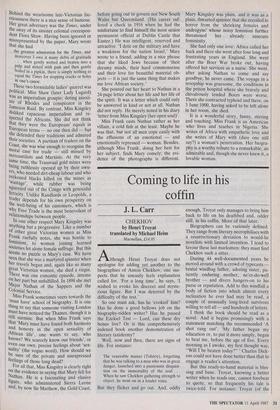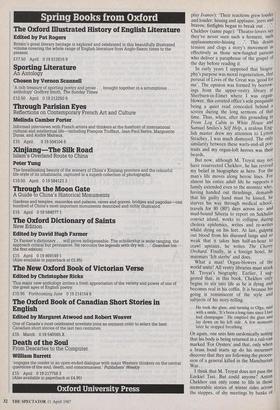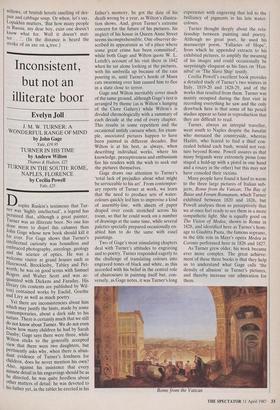Coming to life in his coffin
J. L. Carr
CHEKHOV by Henri Troyat translated by Michael Heim Macmillan, £14.95 Although Henri Troyat does not apologise for adding yet another to the biographies of Anton Chekhov, one sus- pects that he uneasily feels explanation called for. 'For a long time', he says, 'I wished to evoke his discreet and myste- rious figure. But I was deterred by the difficulty of the test.'
So one must ask, has he 'evoked' him? Has he done a good bellows job on the biography-ridden writer? Has he passed the Ezekiel Test — Lord, can these dry bones live? Or is this comprehensively indexed book another demonstration of literary taxidermy?
Well, now and then, there are signs of life. For instance:
The venerable master (Tolstoy), forgetting that he was talking to a man who was in great danger, launched into a passionate disquisi- tion on the immortality of the soul . . . When he saw Chekhov gathering strength to object, he went on in a louder voice.
But they flicker and go out. And, oddly enough, Troyat only manages to bring him back to life on his deathbed and, odder still, in his coffin. More of that later.
Biographers can be variously defined. They range from literary necrophiliacs with a resurrectionary deviation to would-be novelists with limited invention. I tend to favour these last marksmen: they must find Chekhov such a sitter.
During 44 well-documented years he moved around with a crowd of typecasts — brutal windbag father, adoring sister, pa- tiently enduring mother, ne'er-do-well brother — and divers hangers-on to his purse or reputation. Add to this windfall a body of fiction into which almost every inclination he ever had may be read, a couple of unusually long-lived survivors willing to tell all — and hundreds of letters.
I think the book should be read as a novel. And it begins promisingly with a statement matching the recommended 'A shot rang out'. 'My father began my education or, to put it -more simply, began to beat me, before the age of five. Every morning as I awoke, my first thought was, "Will I be beaten today?" ' Charles Dick- ens could not have done better than that to engage a reader's attention.
But this ready-to-hand material is bles- sing and bane. Troyat, knowing a better writer when he reads one, cannot forebear to quote, so that frequently his tale is twice-told. For instance: Troyat (of the play Ivanoy): 'Their reactions grew louder and louder: hissing and applause, jeers and bravos; fistfights began to break out . . .'• Chekhov (same page): `Theatre-lovers say they've never seen such a ferment, such applausamento-hissing . . .'. This drains tension and clogs a story's movement as effectively as those new-fangled parsons who deliver a paraphrase of the gospel of the day before reading it.
In early years I supposed that biogra- phy's purpose was moral regeneration, that perusal of Lives of the Great was 'good for me'. The opinion was formed by borrow- ings from the upper-vestry library at Sherburn-in-Elmet where I was organ blower, this coveted office's sole perquisite being a quiet read concealed behind a screen during the long sermons of that time. Thus, when, after this grounding in From Log Cabin to White House and Samuel Smiles's Self Help, a zealous Eng- lish master drew my attention to Lytton Strachey, I was much dismayed. The onlY similarity between these warts-and-all por- traits and my organ-loft heroes was their beards.
But now, although M. Troyat may not have resurrected Chekhov, he has revived my belief in biographee as hero. For the man's life moves along heroic lines. For almost his entire adult life he supports a family extended even to the monster who, having handed out thrashings, demands that his guilty hand must be kissed, he starves his way through medical school, travels for 80 (80!) days across ice- and mud-bound Siberia to report on Sakhalin convict island, works to collapse during cholera epidemics, writes and re-writes whilst dying on his feet. At last, gulping out blood from his diseased lungs and so weak that it takes him half-an-hour to crawl upstairs, he writes The CherrY Orchard. Finally, in a foreign hotel, he murmurs `Ich sterbe' and does.
What a man! Organ-blowers of the world unite! All vestry libraries must stock M. Troyat's biography. Earlier, I sug- gested that, in this book, Chekhov only begins to stir into life as he is dying and becomes real in his coffin. It is because his going is reminiscent of the style and subjects of his story-telling.
He took the glass, and turning to Olga, said with a smile, 'It's been a long time since I last had champagne.' He emptied the glass and lay down on his left side. A few moments later he stopped breathing.
Or again, one sees him sardonically noting that his body is being returned in a rail-van marked 'For Oysters' and that, only when a brass band starts up do his mourners discover that they are following the proces- sion of a general killed in the Manchurian War.
I think that M. Troyat does not pass the Ezekiel Test. But could anyone? Anton Chekhov can only come to life in those memorable stories of winter rides across the steppes, of shy meetings by banks of Willows, of brutish hovels smelling of des- pair and cabbage soup. Or when, let's say, Lopakhin mutters, 'But how many people in Russia, my dear boy, exist one doesn't know what for. Well it doesn't mat- ter (In the distance is heard the stroke of an axe on ktree.)


























































 Previous page
Previous page